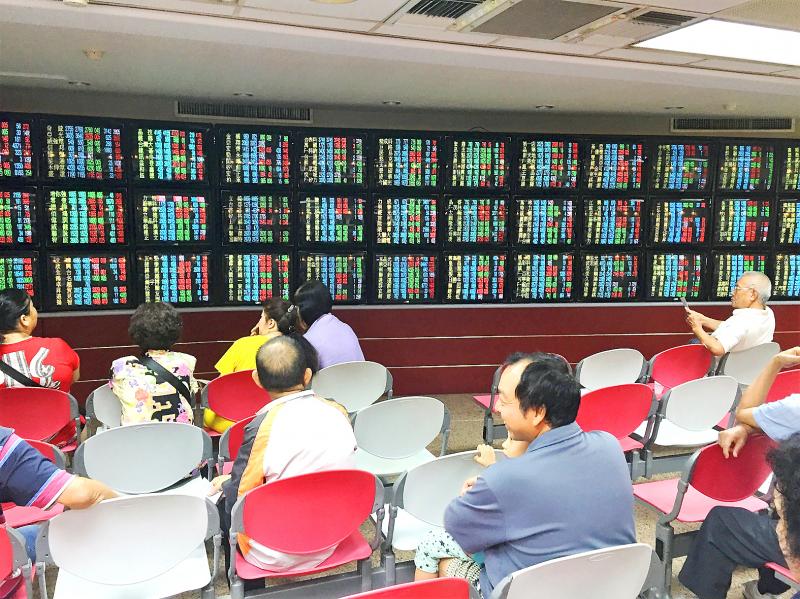The TAIEX would hover at about 17,470 points at the end of this year, with the weighted index witnessing more volatility in the third quarter due to uncertainty over the US’ monetary policy, UBS Securities Pte Ltd, Taipei Branch said yesterday.
The TAIEX yesterday closed up 0.07 percent at 17,075.55 points, down 3 percent from a record high of 17,595 points on April 27, but up 16 percent year to date, Taiwan Stock Exchange data showed.
The benchmark index is likely to remain at this high level at the end of the year, despite a spate of COVID-19 infections, as solid corporate revenues and exports should support the index, UBS analyst Ally Chen (陳玟瑾) told a videoconference.

Photo: Kelson Wang, Taipei Times
“For those companies we cover, we estimate their combined profits would grow more than 30 percent this year from last year,” she said.
Although the TAIEX fell after COVID-19 cases surged last month, it has quickly recovered, she added.
However, “huge volatility” in Taiwanese equities is also possible next quarter, as local stocks would be affected once the US Federal Reserve announces new liquidity-tightening measures, she said.
In 2013, when the Fed announced that it was ending its bond-buying program, which it began in 2008 in response to the financial crisis, the news took a toll on local stocks, Chen said.
However, by the time the Fed started reducing its purchases in 2014, local stocks had regained their momentum due to solid fundamentals, she said.
“Therefore, we might see a similar impact on the TAIEX next quarter, and we suggest investors avoid overpriced stocks that are less resilient to a tighter monetary policy,” Chen said.
Investors are also advised to monitor several key gauges, including corporate revenues, growth in demand for end products from the US and Europe after COVID-19 lockdown measures end and inflation’s effect on corporate earnings, she said.
Asked if local shipping stocks would remain strong due to rising freight rates, UBS head of Taiwan research James Kan (甘清仁) said that COVID-19 vaccination programs would play a role in it, because if more people are able to return to their posts, supply chain disruptions and port congestion would be relieved.
The vaccination rate in the US is predicted to hit 60 percent next month, which would normalize many businesses, he said.
“It is hard to imagine that freights rates would remain that high for long,” Kan added.

STILL HOPEFUL: Delayed payment of NT$5.35 billion from an Indian server client sent its earnings plunging last year, but the firm expects a gradual pickup ahead Asustek Computer Inc (華碩), the world’s No. 5 PC vendor, yesterday reported an 87 percent slump in net profit for last year, dragged by a massive overdue payment from an Indian cloud service provider. The Indian customer has delayed payment totaling NT$5.35 billion (US$162.7 million), Asustek chief financial officer Nick Wu (吳長榮) told an online earnings conference. Asustek shipped servers to India between April and June last year. The customer told Asustek that it is launching multiple fundraising projects and expected to repay the debt in the short term, Wu said. The Indian customer accounted for less than 10 percent to Asustek’s

‘DECENT RESULTS’: The company said it is confident thanks to an improving world economy and uptakes in new wireless and AI technologies, despite US uncertainty Pegatron Corp (和碩) yesterday said it plans to build a new server manufacturing factory in the US this year to address US President Donald Trump’s new tariff policy. That would be the second server production base for Pegatron in addition to the existing facilities in Taoyuan, the iPhone assembler said. Servers are one of the new businesses Pegatron has explored in recent years to develop a more balanced product lineup. “We aim to provide our services from a location in the vicinity of our customers,” Pegatron president and chief executive officer Gary Cheng (鄭光治) told an online earnings conference yesterday. “We

LEAK SOURCE? There would be concern over the possibility of tech leaks if TSMC were to form a joint venture to operate Intel’s factories, an analyst said Taiwan Semiconductor Manufacturing Co (TSMC, 台積電) yesterday stayed mum after a report said that the chipmaker has pitched chip designers Nvidia Corp, Advanced Micro Devices Inc and Broadcom Inc about taking a stake in a joint venture to operate Intel Corp’s factories. Industry sources told the Central News Agency (CNA) that the possibility of TSMC proposing to operate Intel’s wafer fabs is low, as the Taiwanese chipmaker has always focused on its core business. There is also concern over possible technology leaks if TSMC were to form a joint venture to operate Intel’s factories, Concord Securities Co (康和證券) analyst Kerry Huang (黃志祺)

It was late morning and steam was rising from water tanks atop the colorful, but opaque-windowed, “soapland” sex parlors in a historic Tokyo red-light district. Walking through the narrow streets, camera in hand, was Beniko — a former sex worker who is trying to capture the spirit of the area once known as Yoshiwara through photography. “People often talk about this neighborhood having a ‘bad history,’” said Beniko, who goes by her nickname. “But the truth is that through the years people have lived here, made a life here, sometimes struggled to survive. I want to share that reality.” In its mid-17th to